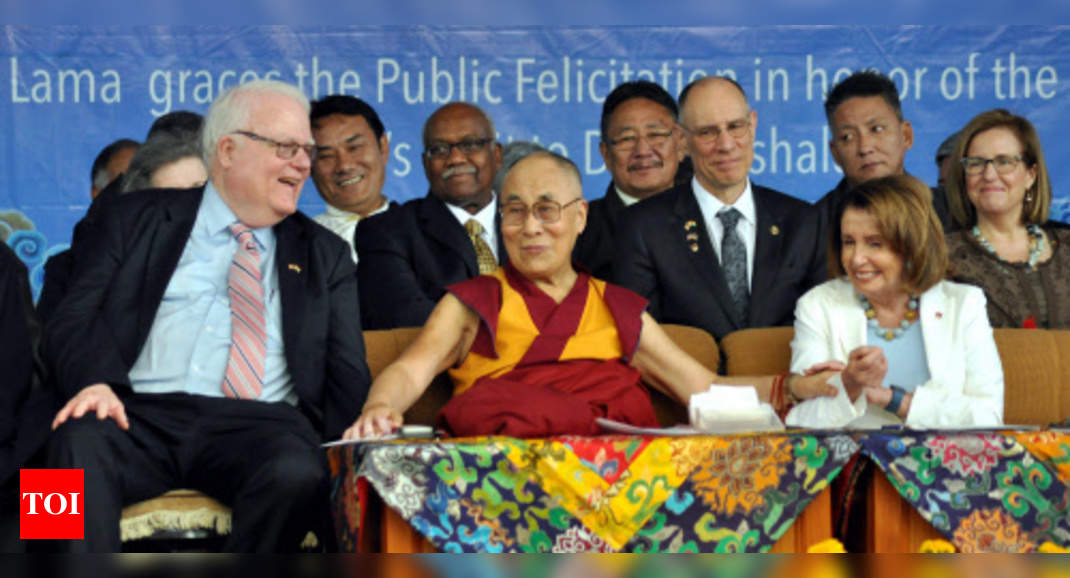


A high-profile US Congressional delegation, including former speaker Nancy Pelosi, has arrived in India for a two-day visit. On Wednesday, the delegation visited the Dalai Lama Temple in Himachal Pradesh's Dharamshala to meet the Tibetan spiritual leader. The visit comes amid rising tensions between the US and China and reports that US President Joe Biden is set to sign a bill that puts pressure on China to resolve the Tibet dispute. China has criticized both the visit and the bill, stating that Tibet is an internal matter and does not allow interference from external forces.
Background:
Nancy Pelosi, the former Speaker of the US House of Representatives, led a high-profile congressional delegation to India on Wednesday, March 8, for a two-day visit. The delegation's itinerary included a meeting with the Dalai Lama, the Tibetan spiritual leader, in Dharamshala, Himachal Pradesh.
Political Significance:
The visit comes against the backdrop of heightened tensions between the US and China. China considers Tibet an integral part of its territory, while the Dalai Lama and his followers advocate for Tibetan autonomy. The US has consistently supported dialogue between China and the Tibetans.
Reaction from China:
China vehemently condemned the visit, calling it a "gross interference" in its internal affairs. The Chinese Foreign Ministry spokesperson stated, "China firmly opposes any foreign official's visit to Tibetan areas of China, any contact with the Dalai Lama clique, or any attempt to use Tibet-related issues to interfere in China's internal affairs."
US Congressional Support for Tibet:
The congressional delegation's visit aligns with a recently passed US bill that calls on China to engage in "meaningful" dialogue with the Tibetans and respect their human rights. President Joe Biden is expected to sign the bill into law shortly.
FAQs:
Why is China so sensitive about Tibet? China views Tibet as a strategically important region that secures its borders and access to water resources. It also holds cultural and religious significance for the Chinese government.
Who is the Dalai Lama? The Dalai Lama is the spiritual leader of Tibetan Buddhism. He has been living in exile in India since the Chinese invasion of Tibet in 1950.
What is the US's stance on Tibet? The US supports dialogue between China and the Tibetans and recognizes the Dalai Lama as a religious figure. However, it does not endorse Tibetan independence.
What are the chances of resolving the Tibet dispute? The dispute remains highly complex, and a resolution requires political will and cooperation from both China and the Tibetan leadership.
What are the potential consequences of the congressional delegation's visit to India? The visit is likely to further strain relations between the US and China and could lead to retaliatory measures from the Chinese government.

Indian Prime Minister Narendra Modi declared that the year 2026 will be marked as the "ASEAN-India Year of Maritime Cooperation" during the 22nd ASEAN-India Summit. This announcement highlights India's growing alignment with the ASEAN bloc, with Modi emphasizing the importance of the partnership in terms of strategic and economic cooperation. The Summit's theme of "Inclusivity and Sustainability" also reflects the shared priorities of both India and ASEAN, with joint efforts in areas such as digital inclusion, food security, and resilient supply chains. In addition to strategic cooperation, Modi also highlighted the expansion of collaboration in other areas such as education, tourism, and cybersecurity, while acknowledging the new member Timor-Leste and extending condolences to Thailand. Looking ahead, Modi expressed confidence in the long-term vision of ASEAN and India's development goals, stating that the 21st century belongs to both India and ASEAN.

During his virtual address to the 22nd ASEAN-India Summit, Prime Minister Narendra Modi highlighted the shared cultural and historical ties between the two regions and stressed the importance of ASEAN in India's Act East Policy. He reaffirmed India's commitment to ASEAN centrality and hailed the ASEAN-India Comprehensive Strategic Partnership as a foundation for regional growth and global stability. With Malaysia as the current ASEAN chair and the Philippines set to take over in 2026, discussions at the upcoming East Asia Summit will focus on Indo-Pacific security and regional stability.

During their stay in Indore for the Women's Cricket World Cup, two Australian players were molested by Aqueel Khan, a known criminal with a history of offenses. The man was caught after an eyewitness noted down the number plate of his motorcycle, allowing the police to track him down through CCTV footage. The Australian team, who were staying at Radisson Blu Hotel in Indore, reacted strongly to the incident and filed a complaint with the police. The Madhya Pradesh Cricket Association has condemned the incident and offered support to the affected players.

The leaders of five European countries, including PM Keir Starmer and Ukrainian President Volodymyr Zelensky, gathered in London to address the ongoing war in Ukraine. Starmer declared that Russian President Vladimir Putin is not serious about pursuing peace, while Zelensky thanked the US for imposing new sanctions on Russia. Outside of the summit, Ukrainians shared their experiences and fears of living in a warzone.

India and the US are on the verge of finalizing a trade deal, with both sides making significant progress and ironing out most issues. Union Minister of Commerce and Industry, Piyush Goyal, clarified that India will not succumb to pressure and will only enter into a deal that is fair and beneficial for both countries. Furthermore, Goyal emphasized that India's approach is driven by a long-term vision, rather than momentary pressure or deadlines.

Delhi Police has arrested two ISIS operatives who planned to carry out blasts during Diwali celebrations in South Delhi. The suspects were reportedly radicalised online and had conducted recce of busy locations to inflict maximum casualties. Police believe the accused were in touch with foreign handlers and are looking into potential links to Pakistan's ISI. Investigations are ongoing to determine if the suspects have attempted to recruit others in Delhi and Bhopal.

In recognition of World Polio Day, Navi Mumbai joined the global effort to eradicate the paralyzing and vaccine-preventable disease by hosting an End Polio Now Laser Display. This initiative, organized by the Rotary Club of Navi Mumbai Joy of Giving, in collaboration with various organizations, aims to raise awareness and support for the cause. Despite significant progress, vigilance and continued commitment are still crucial to achieve a polio-free world.

The US and Australia have signed a deal to boost cooperation on rare earths and critical minerals, with the goal of reducing dependence on China. Australian Prime Minister Albanese has pledged to invest billions in crucial projects in the next six months as part of the agreement. Trump also emphasized the importance of the Aukus defense pact with Australia and the UK, stating that it serves as a deterrent against China. The deal is now moving forward quickly, with only minor clarifications left to be made.

Top US officials, including Vice President JD Vance and Secretary of State Marco Rubio, have spoken out against the Israeli parliament's vote to annex the already-occupied West Bank. Vance called the vote a "stupid political stunt" that could harm ongoing efforts towards a ceasefire and peace deal. Rubio warned that the move could jeopardize President Trump's plan to end the conflict. Despite the Knesset's approval, both officials reiterated that it is not the policy of the US to support annexation of the West Bank by Israel.

Pannir Selvam, a 28-year-old Malaysian man, received the death sentence in Singapore after being convicted of drug trafficking. Pannir's family, who remember him as a playful and talented musician, were shocked to hear of his arrest and have been fighting for his release ever since. With Singapore's strict laws against drug trafficking, Pannir's fate now lies in the hands of the court.